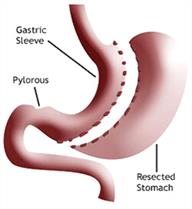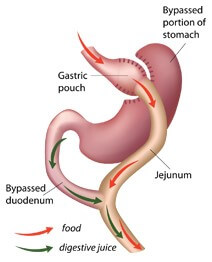Bariatric Surgery Program
For a Referral to a Bariatric Surgeon, Call, CALL 888-724-7123
Frequently Asked Questions
What is the success rate for weight loss surgery?
60 - 80% of patients achieve success over the long term.
What types of bariatric surgical procedures can be performed?
There are three main types of procedures:
-
Sleeve Gastrectomy creates a small pouch by surgical removal of a large portion of the stomach. This a restrictive procedure which removes an area of the stomach responsible for producing ghrelin the ‘hunger hormone.’

-
Gastric Bypass Surgery separates the stomach into two unequal compartments. During digestion, the food empties from the tiny stomach pouch into the upper intestine.

-
Gastric Banding is a procedure in which the stomach is encircled with an inflatable plastic band that restricts food intake.

Can weight loss surgery be reversed?
Gastric restrictive operations are potentially reversible. This is achieved easier with the banding procedure. Due to the complexity associated with the Gastric Bypass procedure reversal is only attempted in emergency medical situations.
Is weight loss surgery a guarantee for permanent weight loss?
No. Some patients may regain substantial portion of the weight that is lost. This is especially true if the patient does not follow the dietary guidelines in the months and years following the procedure. Patients with the Laparoscopic Band procedure will need frequent adjustment of their bands in order to maximize their weight loss potential.
Must I be in good health to qualify for the surgery?
Many morbid obese patients are in poor health because of diseases caused by their obesity. These diseases include diabetes, high blood pressure, heart problems, lung problems and kidney difficulties. Patients must be medically cleared and be able to undergo general anesthesia.
Will I need any preoperative tests?
All patients require specific blood tests, a chest x-ray, and an electrocardiogram (EKG). Patients are also tested for a bacteria that causes ulcers (known as H. pylori) and for gall stones. Some patients may require a sleep study (for sleep apnea). All require a psychological evaluation.
Are there different ways the surgery can be performed?
Yes. The preferred method by many patients is the laparoscopic approach in which the operation is performed through four to six very small incisions. The benefits of this method include less pain and a faster recovery time for the patient. It is an appropriate method for most, but not all, patients. There is also the traditional, open approach, in which a mid-line incision is made.
How long does the operation take?
Anywhere from two to three hours in most cases, occasionally longer.
How long can I expect to stay in the hospital?
Most patients can expect a hospital stay of two to four days for a laparoscopic gastric bypass procedure and three to five days for an open procedure gastric bypass. Laparoscopic banding is an overnight stay in most cases.
When can I expect to return to work and resume a normal lifestyle?
Most patients return to work and all levels of pre-surgery activity within three to six weeks, when done minimally invasively.



